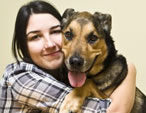March is poison prevention month with special attention to the week of March 16-22, which is known as national poison prevention week. Did you know that many substances found in and around your home can be dangerous to your pets? It is important to be aware of your surroundings just like childproofing your home, pet owners should pet proof their homes. Below is a list of things to consider when “pet proofing” your home.
- Certain foods can be toxic to pets if large amounts are ingested. It is best to try and memorize these foods: Alcoholic beverages, avocado, chocolate, coffee, fatty foods, macadamia nuts, moldy/spoiled foods, onions, rasins and grapes, salt, and yeast dough.
- For a more detailed list of what you can and cannot feed your pets, check out the post on “Foods you shouldn’t feed pets”
- Painkillers and other common medications can be deadly to your pets, so be sure to keep all prescription and over-the-counter drugs in closed cabinets out of your pets’ reach. Do not give your pets medications unless directed to do so by a veterinarian.
- Does your pet have fleas? Make sure to read the label before using any kind of flea-control products on or around your pets. When products are misused, problems result ranging from vomiting to diarrhea but can be more serious such as difficulty breathing, muscle tremors and seizures.
- Do not use a flea-control formula on your cat that’s meant for dogs or vice-versa.
- For example, there are more than 18 brands of flea-control products for canines that contain permethrin which is potentially life-threatening to felines.
- Many common houseplants can be poisonous to your pets. Yes lilies are my favorite flower, but did you know that many members of the lily family can cause kidney failure in cats if ingested?
- With winter in full roar, anti-freeze is a common household product at the moment. But even a small amount of anti-freeze can be fatal to both dogs and cats. Make sure to clean up any spills immediately and consider switching to a propylene glycol -based antifreeze – found to be much less toxic than your common ethylene glycol antifreeze.
- Make sure to wash your pets paws off after your winter walks. These snow melting products can be irritating to the skin and paws, and toxins can be ingested when your pet licks his paws.
- When applying weed killer, insecticide, or fertilizer to your plans and lawn make sure to follow directions for proper application and do not let your pets in these areas until amount of time listed by the manufacturer has passed and the product has thoroughly dried. Your pet could get sick by simply licking their paws after walking through the treated area.
- Always store lawn and garden products in areas that are inaccessible to animals. This includes paint, oil, gasoline and other chemicals that could be potentially dangerous.
- Many plants and trees growing outside can be harmful to pets ingested, so make sure if a species of plant is safe before you begin your landscape work.
- For example, cardiotoxic plants – those plants that can have negatively affect the heart include lily of the valley, azalea, oleander, and foxglove. Rhubarb leaves can cause kidney failure. Cycads and some species of mushrooms can cause liver failure.
- Make sure your pets can’t get into something they shouldn’t. Secure all your garbage cans with tamper proof lids.
 Pet Pics Daily A community for pet lovers!
Pet Pics Daily A community for pet lovers!



